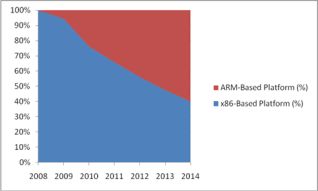
In accordo al seguente comunicato, pubblicato dall'agenzia di ricerche di mercato ABI Research, il 90% dei sistemi di tipo UMD (Ultra Mobile Devices), come netbook, MID (Mobile Internet Devices), smartbook e UMPC, commercializzato nel 2009 è basato su una architettura con cpu di tipo x86.
Tuttavia il recente ingresso nel settore delle prime soluzioni basate su un processore ARM è destinato non soltanto ad offrire una ulteriore possibilità di scelta per produttori e consumatori ma anche a compromettere il dominio dei sistemi x86.
Infatti il rapporto di forza tra i prodotti x86-based e quelli ARM-based è destinato a cambiare, fino alla completa inversione, attesa, secondo lo studio di ABI Research, nel 2013, allorquando il numero di device su piattaforma ARM che arriveranno in commercio sarà superiore a quello dei sistemi x86 (cfr. il diagramma che segue).
Tra i possibili esempi di soluzioni basate su ARM citiamo il recentissimo smartbook Skylight di Lenovo.


NEW YORK - January 21, 2010 - While an estimated 90% of Ultra-mobile Devices (UMDs) shipped in 2009 were based on an x86 processor architecture, the introduction of ARM-based systems introduces greater choice and differentiation for system vendors.
ABI Research forecasts that annual UMD shipments of netbooks, MIDs, smartbooks and UMPCs based on ARM instruction sets will overtake x86-based UMDs in 2013. According to senior analyst Jeff Orr, "2010 will be pivotal for building momentum behind non-x86 solutions, and gaining adoption in both distribution channels and by end-user populations worldwide."
The important netbook segment of the UMD market is now moving into its second generation, and a growing number of netbooks based on ARM platforms are now appearing in the market, a trend no doubt helped by the perception that ARM-based systems are heavily oriented towards an "always connected" mode of operation. Additionally, ARM-based products are coming out in a growing variety of different form-factors including tablets.
There is a further important implication of this trend. Much is made in the media of certain mobile operators’ difficulties in providing sufficient network capacity to handle the growing demand for data. Users of devices such as the iPhone are often cited as the greatest source of that demand. Orr disagrees. "In fact, that’s a distraction," he says. "In general, laptops and netbooks with embedded or attached modems contribute a significantly greater amount of traffic to 3G networks than smartphones do."
The proliferation of netbooks and other mobile devices sporting ARM-based processors will only exacerbate this data demand which Orr describes as "not a tidal wave, but a rising tide. Operators are working out their strategies for capacity expansion based on today’s best expectations of future demand from data-centric devices. The main issues revolve around backhaul, followed by increased 3G and 4G BTS deployments."
ABI Research’s Market Data product "Netbooks, MIDs, and Mobile CE Market Data" provides shipment, ASP and revenue forecasts for all Ultra-mobile Devices (UMDs) including UMPCs, netbooks, mobile Internet devices (MIDs)/smartbooks, and six categories of mobile CE devices.
It is included in the firm’s Netbooks, MIDs and Mobile CE Research Service which also includes other Market Data, Research Reports and Briefs, ABI Insights, ABI Vendor Matrices, and analyst inquiry support.
News Source: ABI Research Press Release
Links

